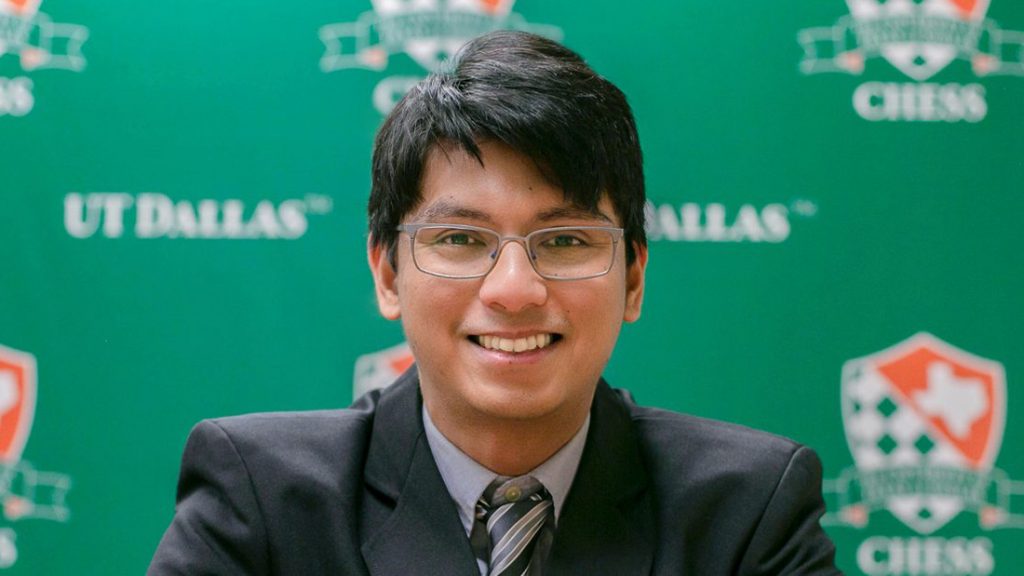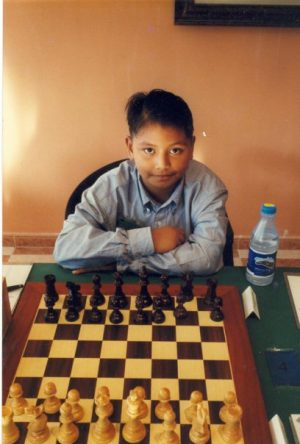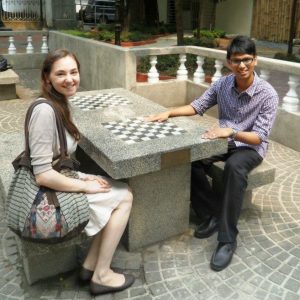For Julio Catalino Sadorra BS’13, Chess is About More than Grandmaster Title
By: Development Communications | March 9, 2021
Alumni News

At the ripe age of 6, Julio Catalino Sadorra BS’13 discovered his competitive side. A native of the Philippines, Sadorra’s first love was basketball, until his dad organized a chess tournament in the family’s neighborhood. Then everything changed.
“My dad told me I couldn’t play, because chess was for older people,” Sadorra said. “But I twisted his arm to teach me. He’d give me lessons after he got home from work, and eventually he ran out of things to teach me.”
After he learned the basics, Sadorra began to challenge his neighbors to matches. He’d carry his wooden chess set under one arm, with a bag of canned goods under his other arm, telling them he’d give them a can if they beat him.
“I needed to give my neighbors motivation to play a kid like me,” Sadorra said. “I got them to play me every day until I didn’t have to give away any more canned goods.”
Sadorra quickly became consumed by the game of chess, gobbling up books about game theory and strategy, then applying what he’d learned to his practice. He enrolled in the Milo Checkmate Chess Clinic, where his skills were assessed. He was ranked as a level 2.
“In the clinic, I went from level 2 to advanced pretty quickly. I was just really hungry,” Sadorra said. “I started reading more books, but I wanted to play more.”
In grade school, Sadorra took his playing to the next level by participating in scholastic meets and competing in national leagues. With weekends spent at chess tournaments around his home country, it became evident to Sadorra’s parents and teachers that chess was more than a game for him — it was his future.
“I grew up in the Michael Jordan era. Every time I watched him play basketball, it was something special,” Sadorra said. “Because of that inspiration, that’s how I trained. I took every competition seriously.”

At 10 years old, Sadorra competed in the Shell National Youth Rapid Championships, traveling to different provinces in the Philippines to face off against the best junior players in the country.
“Competing was a really important part of my development,” Sadorra said. “I got a win in each category, and the hard work paid off.”
Sadorra continued competing in chess tournaments and championships, even taking time off from school to devote more time to preparation. Competing and winning at a higher level gave him motivation to become an international master, a title that would require him to win three norms, or perform at the same level three times.
In 2004, he earned a master title from the International Chess Federation (FIDE), followed by an international master title three years later at the age of 21.
“It was a great relief,” he said. “It gave me confidence and took off some pressure.”
The next step was a grandmaster title, the highest achievement a chess player can earn from the FIDE. After winning one norm, Sadorra competed in the Battle of the Grandmasters in 2008 for a chance to earn his second norm. Sadorra ultimately lost, coming half of a point away from his goal. It was a crushing loss, one that made him reevaluate his priorities.
“I had graduated high school, and I wanted to take a year break,” Sadorra said.
In 2009, after playing a UT Dallas Chess Team player online, Sadorra applied to UT Dallas in the hopes of earning a business degree from the Naveen Jindal School of Management.
“My mindset was, ‘OK, I got this scholarship and I want to do well in school and put chess to the side,’” Sadorra said. “I accepted that maybe I might not get the grandmaster norm.”
After the initial culture shock of moving to a new country without the support of his family nearby, Sadorra began to expand his social circle and become involved in campus culture.
“Before, instead of going to parties or social gatherings, I chose to hang out with chess,” Sadorra said. “But thanks to UT Dallas, I was able to develop the extrovert in me. I learned that there was actually life outside of chess.”
Still, Sadorra joined the UT Dallas Chess Team, where his dream of becoming a grandmaster was revived, thanks to the motivation he received from his new teammates and the tournament opportunities he received from the Chess Program. In 2010, Sadorra earned his second norm at the Battle of the Grandmasters during a summer visit to the Philippines.
“Taking a break and getting to play with my teammates refreshed my mind,” Sadorra said. “Instead of being under so much pressure, I was more relaxed.”
In 2011, Sadorra earned his third norm and received the title of grandmaster, an achievement less than 2,000 players in the world hold today.
“I was elated — so relieved,” Sadorra said. “It was kind of hard to believe.”

After graduating from UT Dallas in 2013, Sadorra started a private coaching business while he continued to play chess competitively. In 2015, he made drastic changes to his diet and exercise routine, focusing on his physical training. A year later, in what Sadorra calls his most memorable chess experience to-date, he played Magnus Carlsen, the top-ranked player in the world, to a draw.
“I look back at that year, and that disciplined routine I went through was the best work,” Sadorra said.
In 2019, UT Dallas named Sadorra as the next coach of the UT Dallas Chess Team, a full-circle moment for the former player and graduate. Now, Sadorra uses his past experiences to encourage the team to overcome the challenges they face when competing against top players.
“Whenever things are getting tough for a player, I like giving a simple encouragement or sharing a past experience on how I came back from a similar setback,” Sadorra said. “It brings me joy and fulfillment whenever I see them experience a breakthrough.”
Although Sadorra is proud of the years of hard work and dedication it took to earn his grandmaster title, he knows it’s not the accolades that stand out as much as the memories he made along the way.
“It’s the journey that makes and shapes you,” Sadorra said. “It’s more important than that title.”
Sadorra’s Book Recommendations for Beginners:
“Play Winning Chess” by Yasser Seirawan. It’s a great introduction to the game and its fundamental principles.
“How to Beat Your Dad at Chess” by Murray Chandler. This book contains the most common and helpful checkmate patterns.
“1001 Chess Exercises for Beginners: The Tactics Workbook that Explains the Basic Concepts, Too” by Franco Masetti and Roberto Messa. Recognizing chess patterns is key to improvement, so studying and working with these exercises regularly are bound to help win more games.